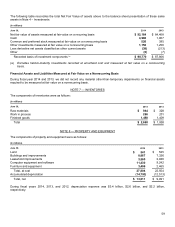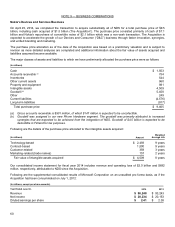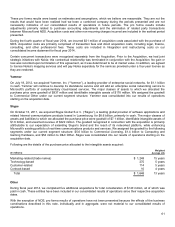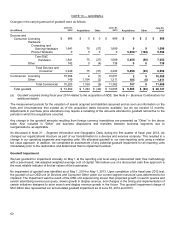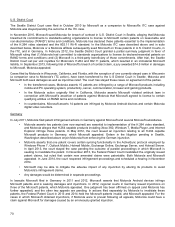Microsoft 2014 Annual Report Download - page 70
Download and view the complete annual report
Please find page 70 of the 2014 Microsoft annual report below. You can navigate through the pages in the report by either clicking on the pages listed below, or by using the keyword search tool below to find specific information within the annual report.
69
Three similar cases pending in British Columbia, Ontario, and Quebec, Canada have not been settled. In March 2010, the
court in the British Columbia case certified it as a class action. The plaintiffs successfully appealed a British Columbia
Court of Appeal decision reversing class certification and dismissing the case. In October 2013, the Canadian Supreme
Court reversed the appellate court and reinstated part of the British Columbia case, which is now scheduled for trial in
September 2015. The other two cases were inactive pending action by the Supreme Court on the British Columbia case.
Other Antitrust Litigation and Claims
Novell litigation
In November 2004, Novell, Inc. (“Novell”) filed a complaint in U.S. District Court for the District of Utah (later transferred to
federal court in Maryland), asserting antitrust and unfair competition claims against us related to Novell’s ownership of
WordPerfect and other productivity applications during the period between June 1994 and March 1996. After the trial court
dismissed or granted summary judgment on a number of Novell’s claims, trial of the one remaining claim took place in late
2011 and resulted in a mistrial. In July 2012, the trial court granted Microsoft’s motion for judgment as a matter of law.
Novell appealed this decision to the U.S. Court of Appeals for the Tenth Circuit, which affirmed the trial court’s decision in
September 2013. The Supreme Court denied Novell’s petition for review in April 2014.
Go Computer litigation
In June 2005, GO Computer Inc. and co-founder Jerry Kaplan filed a complaint in California state court asserting antitrust
claims under the Cartwright Act related to the business of the former GO Corporation in the early 1990s and its successor
in interest, Lucent Corporation in the early 2000s. All claims prior to June 2001 have been dismissed with prejudice as
barred by the statute of limitations. After a mini-trial on standing issues, the case is now moving forward with discovery,
and a trial is set for September 2015.
China State Administration for Industry and Commerce investigation
On July 28, 2014, Microsoft was informed that China’s State Administration for Industry and Commerce (SAIC) had begun
a formal investigation relating to China’s Anti-Monopoly Law, and the SAIC conducted onsite inspections of Microsoft
offices in Beijing, Shanghai, Guangzhou, and Chengdu. SAIC has stated the investigation relates to compatibility, bundle
sales, and file verification issues related to Windows and Office software.
Patent and Intellectual Property Claims
Motorola litigation
In October 2010, Microsoft filed patent infringement complaints against Motorola Mobility (“Motorola”) with the
International Trade Commission (“ITC”) and in U.S. District Court in Seattle for infringement of nine Microsoft patents by
Motorola’s Android devices. Since then, Microsoft and Motorola have filed additional claims against each other with the
ITC, in federal district courts in Seattle, Wisconsin, Florida, and California, and in courts in Germany and the
United Kingdom. The nature of the claims asserted and status of individual matters are summarized below.
International Trade Commission
In May 2012, the ITC issued a limited exclusion order against Motorola on one Microsoft patent, which became effective in
July 2012 and was affirmed on appeal in December 2013. In July 2013, Microsoft filed an action in U.S. District Court in
Washington, D.C. seeking an order to compel enforcement of the ITC’s May 2012 import ban against infringing Motorola
products by the Bureau of Customs and Border Protection (“CBP”), after learning that CBP had failed to fully enforce the
order.
In November 2010, Motorola filed an action against Microsoft with the ITC alleging infringement of five Motorola patents
by Xbox consoles and accessories and seeking an exclusion order to prohibit importation of the allegedly infringing Xbox
products. At Motorola’s request, the ITC terminated its investigation of four Motorola patents. In March 2013, the ITC
affirmed there was no violation of the remaining Motorola patent. Motorola appealed the ITC’s decision to the U.S. Court
of Appeals for the Federal Circuit.


